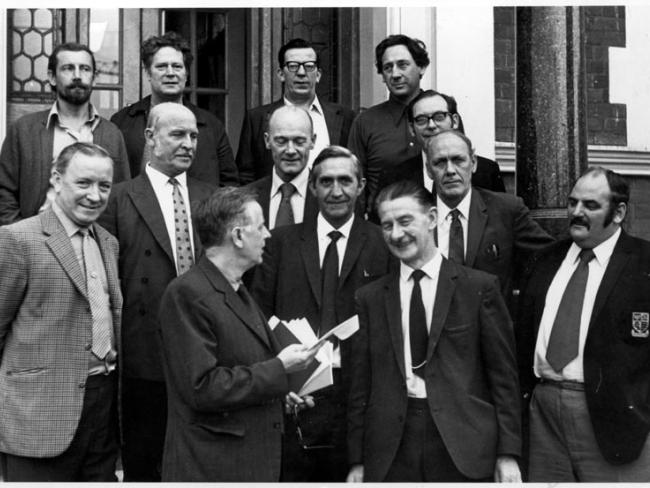
1974: Engineers ready to defend the AUEW headquarters in Peckham against sequestration. Reg Birch is front, second from left.
“Kill the Bill!” was the slogan adopted by trade unions more than forty years ago, in opposition to the Industrial Relations Bill, a Bill which became an Act, and which came perilously close to being accepted in toto by British trade unions. The struggle against it was led by the AUEW, the Amalgamated Union of Engineering Workers, whose fight was in turn led by the renowned Communist, and founder of our Party, Reg Birch. (See “Workers against the state”, Workers, July/August issue.)
More than 40 years later the slogan is raised again, this time applied to the Trade Union Bill. But capitalism and its governments have learned many lessons since then. And the world of work is a different place. In the 1970s there were more than twice as many union members as now.
More importantly there were many more active union members. In sum, the level of class consciousness was qualitatively more advanced back then.
Capitalism’s attack was different too. It represented an attempt to establish a court (the National Industrial Relations Court) which could directly intervene in the running of unions. That this was such an affront to organised workers shows how far we have regressed. The very idea that the law of the land should be used as a weapon in the employers’ hands against unions was decried in almost all union headquarters. Now it is as equally widely accepted. But back then, the courts were defeated.
Enter Thatcher. Her approach (especially significant considering the fact that she was a lawyer) was not to use the courts against the unions. Not in the first instance anyway. The blitzkrieg would be the destruction of the industry in which unions were based and had their strength. First steel, then pits, then docks, then print, then engineering and other forms of manufacture, were, literally, blitzed.
All the places with high union membership were attacked. Then laws were introduced. Gradually the law of the (capitalist) land encroached. The Certification Officer was introduced and strengthened; ballots were enforced, not just for the election of union leaders, but in the conduct of industrial action. Employers were given time to organise their response to action, the workers’ blow being telegraphed like that of a bad boxer.
After the initial resistance (largely, aside from the NUM, putative) all weakness was pounced upon. As union membership fell because of industrial destruction, the noose tightened, the law made ever more draconian.
• Related article: How to defeat the Bill
• Related article: 1: Caught in the check off trap
